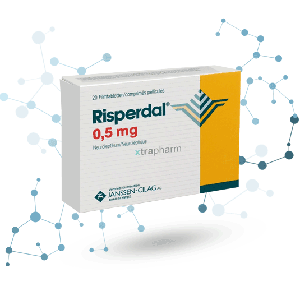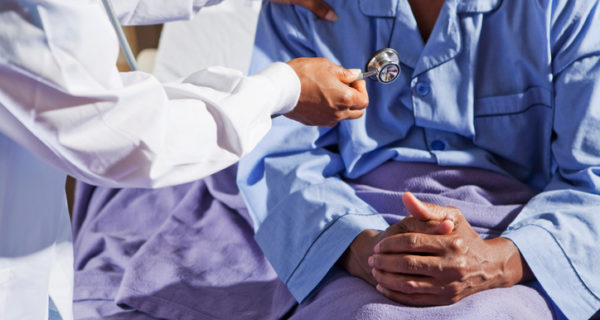Risperdal Side Effects
 Risperdal® (also known as risperidone) is a prescription antipsychotic drug commonly prescribed to treat symptoms of autism, bipolar disorder, schizophrenia, dementia and Tourette syndrome. Consumers should especially be aware of any potentially serious Risperdal side effects experienced by children and elderly patients. If you show signs of having an allergic reaction, hives, swelling or difficulty breathing while taking Risperdal, seek emergency medical help.
Risperdal® (also known as risperidone) is a prescription antipsychotic drug commonly prescribed to treat symptoms of autism, bipolar disorder, schizophrenia, dementia and Tourette syndrome. Consumers should especially be aware of any potentially serious Risperdal side effects experienced by children and elderly patients. If you show signs of having an allergic reaction, hives, swelling or difficulty breathing while taking Risperdal, seek emergency medical help.
Common Risperdal Side Effects and Adverse Reactions
According to the Food and Drug Administration, the most common Risperdal side effects for at least 10% of patients participating in clinical trials include:
- Somnolence (a strong desire to sleep, including for long periods of time)
- Increased appetite
- Fatigue
- Rhinitis (irritation or swelling of the nasal mucus membrane, causing a partially blocked airway)
- Upper respiratory tract infection
- Vomiting
- Coughing
- Urinary incontinence
- Increased saliva production
- Constipation
- Fever
- Parkinsonism (a nervous system disorder affecting movement, including tremors)
- Dystonia
- Abdominal pain
- Anxiety
- Nausea
- Dizziness
- Dry mouth
- Tremors
- Rash
- Akathisia (a state of agitation and distress as well as restlessness)
- Dyspepsia (indigestion)
Severe Risperdal Side Effects
If you or a loved one has any of the following serious side effects or adverse reactions while taking Risperdal, the FDA advises seeking immediate medical attention:
- Cerebrovascular events in elderly patients (including stroke)
- Neuroleptic Malignant Syndrome (a life-threatening disorder with symptoms including high fever, sweating, muscular rigidity, and others)
- Tardive dyskinesia (repetitive involuntary movements, such as grimacing or rapid blinking)
- Hyperglycemia and diabetes mellitus
- Orthostatic hypotension (low blood pressure, which can make you feel dizzy or lightheaded)
- Leukopenia, neutropenia, and agranulocytosis (low white blood cell count in addition to increased chance of infection)
- Potential for cognitive as well as motor impairment
- Seizures
- Dysphagia (difficulty swallowing)
- Body temperature regulation disruption
- Antiemetic effect
- Suicide or suicidal ideation
- Increased sensitivity in patients with Parkinson’s disease
- Diseases or conditions that may affect metabolism or hemodynamic responses
It’s also important to note that in 2005, the FDA issued a black box warning about elderly dementia patients facing a higher risk of death.
Serious Risperdal Side Effects: Gynecomastia in Boys Aged 21 and Under
Of course, many antipsychotic medications can cause secondary health complications. Risperdal side effects may cause significant physical as well as emotional damage to boys and young men taking it to cope with their mental health issues. Psychological illnesses are often caused when a patient’s brain becomes overloaded with one or more specific hormones. (Too much dopamine at the D2 receptor typically causes schizophrenia, for example.) Risperdal works by blocking various dopamine, serotonin, histamine and various androgenic receptors within the patient’s brain. The hormone prolactin regulates breast tissue growth in addition to promoting lactation in young women, whose bodies naturally produce it at a higher rate during puberty. However, prolactin is also released at a higher rate in young men while taking Risperdal, which leads to a condition called gynecomastia (enlarged breasts). A 2015 study shows that 4.5% of boys prescribed Risperdal before age 21 experience gynecomastia.
Surprisingly, Risperdal’s manufacturer, Johnson & Johnson, helped produce this study showing the link to gynecomastia in boys and young men. The company was accused of intentionally manipulating data by replacing any boys older than 10 with girls in order to skew the updated results (though by definition, girls cannot develop gynecomastia). Johnson & Johnson’s final report showed only .8% incidence of gynecomastia, rather than the 4.5% rate initially reported. Despite growing evidence, the FDA has issued no warnings about gynecomastia risk for boys and young men prescribed Risperdal.
Check your eligibility for compensation.
If you or a loved one developed gynecomastia while taking Risperdal, you may be entitled to compensation from the manufacturer. Request your free case evaluation now to see if you may qualify.




